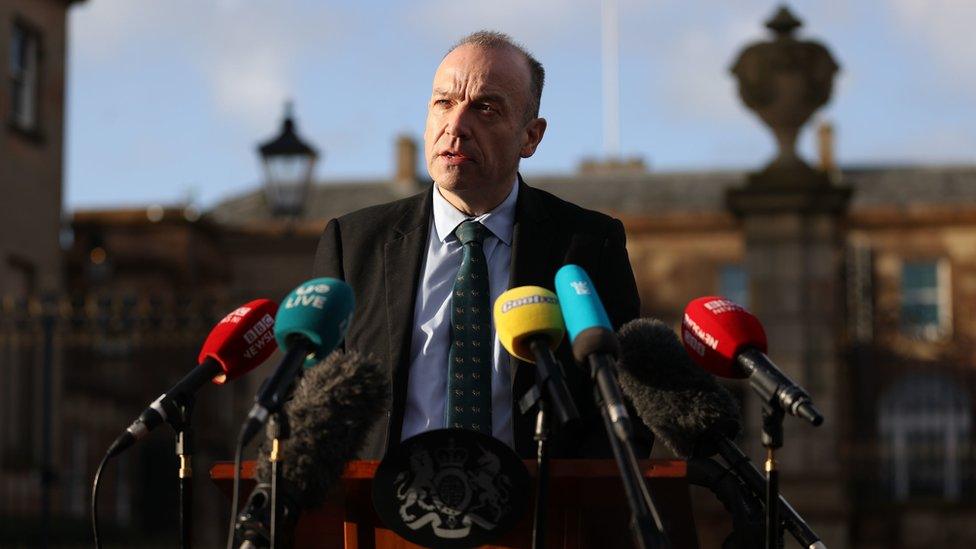Who is on strike in Northern Ireland? Your questions answered
- Published
Northern Ireland strikes: All you need to know in 120 seconds
Nurses, teachers, civil servants, and thousands more are on strike in Northern Ireland on Thursday.
There have been several strikes in Northern Ireland in recent times, but this walk-out is one of the biggest in the region for years.
But why is it happening? And how will it affect you and your family?
Here we answer some of the key questions about the industrial action and what disruption to expect.

Who is going on strike in Northern Ireland?
Teachers, nurses, civil servants, bus drivers and train drivers and many others will be taking to the picket lines on Thursday.
In total, tens of thousands of workers from 16 unions will be part of the mass walk-out. The unions are:
British Dietetic Association (BDA)
Charted Society of Physiotherapists (CSP)
GMB
Irish National Teachers' Organisation (INTO)
Society of Radiographers (SoR)
Siptu
National Association of Headteachers (NAHT)
National Association of Schoolteachers and Union of Women Teachers (NASUWT)
National Education Union (NEU)
Nipsa
Royal College of Midwives (RCM)
Royal College of Nursing (RCN)
Ulster Teachers Union (UTU)
Unison
Unite
University and College Union (UCU)
Why are workers going on strike in Northern Ireland?
For the most part, it's all about pay - or the lack of it.
Many public sector workers have not received a pay rise in the last couple of years. And this, combined with high inflation causing prices to go up, means many are experiencing a real-terms pay cut.
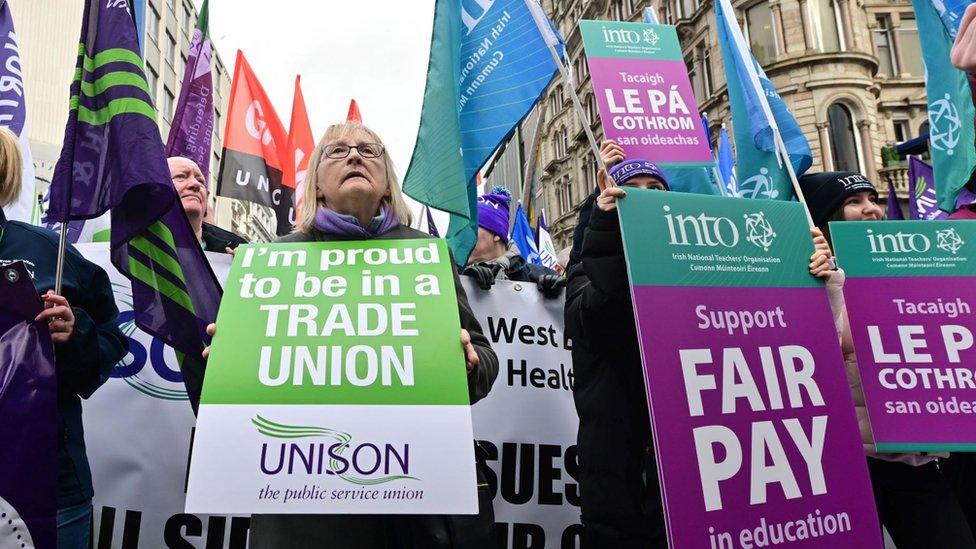
Workers from 15 unions will take part in a walk-out on Thursday 18 January
Unions point to pay rises received by public sector workers in other parts of the UK and say their members are losing out.
For their part, the employers say that they do not have the funds available to make any new pay offers under the budgets allocated to them by the Northern Ireland Secretary Chris Heaton-Harris.
Mr Heaton-Harris allocated the budgets because there is no government in Northern Ireland. The power-sharing executive collapsed in early 2022 when the DUP withdrew its support due to its boycott of trade rules post-Brexit.
Why have there been a lot of strikes in Northern Ireland?
For the same reason - over pay. Various unions and groups have been organising individual strikes going back months. Bus and trains, for instance, halted for four days in December when Translink staff went on strike.
However, Thursday is the biggest move of its kind as several unions have joined together for a "generalised day of action".
Are workers in the rest of the UK paid more than in Northern Ireland?
The short answer in many cases is yes.
While there are, of course, differences across different sectors, broadly speaking public sector workers in Northern Ireland are paid less than their counterparts in other parts of the UK.
This is largely due to pay rises having been agreed for workers in England, Scotland, and Wales in recent years, while many workers in Northern Ireland have been subject to pay freezes.
Here's a few examples of how pay here compares to the rest of the UK:
A teacher's starting salary in Northern Ireland is £24,137; that's compared to £30,000 in England; £30,742 in Wales; and £32,317 in Scotland
A full-time band five nurse in Northern Ireland's starting pay is £27,055; in Wales they could expect to earn £28,834; in England £28,407; and in Scotland £30,399
The median salary for an executive officer in Northern Ireland's civil service last year was £27,130; in England and Wales it's £28,120; in Scotland it's £28,920

The starting salary for teachers in Northern Ireland is £24,137
So, is this the biggest strike ever in Northern Ireland?
That's according to the unions, who say their combined membership of 170,000 people will be on strike.
However, it is unlikely every single member will be on strike and we will have to wait until Thursday to see just how many people walk-out.
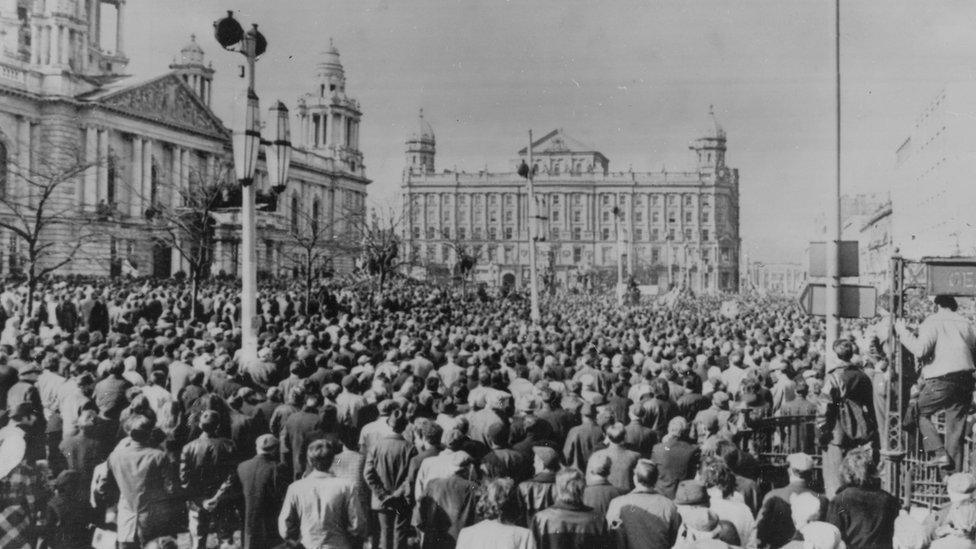
The Ulster Workers' Council strike in 1974 lasted two weeks
It certainly has the potential to be the biggest strike in many years, possibly going back to the Ulster Workers' Council strike of 1974.
That action was organised by unionists who opposed the Sunningdale Agreement, which resulted in the first attempt at power-sharing government between unionists and nationalists in Northern Ireland.
And how will the strike affect services?
A lot - there's going to be widespread disruption across transport, health and education and other services.
Will any buses and trains be running during the strike?
No - Translink have said that none of its bus and train services will be running during the strike.
They'll return to normal on Friday.
However, bus lanes will still be in operation, so if you're caught driving on one on the day of the strike you could get a fine.
Will the strike affect healthcare?
Yes - the Department of Health have asked the public to be very conscious of the fact that a "significantly reduced health service" will be in place on Thursday.
It has advised people to "take all sensible steps to reduce your chances of requiring health service treatment on the day".
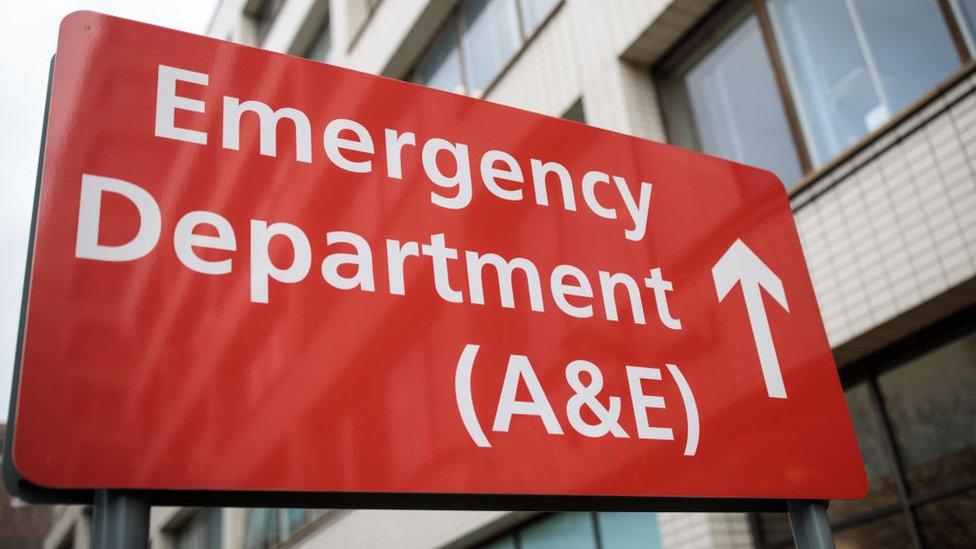
The Department of Health have said that people will still be able to access emergency hospital treatment
However, they have also said that if you do require emergency hospital care on the day of the strikes, "you must seek it immediately".
GPs are not on strike, but will only be operating on an emergency-only basis.
However other services, such as having blood taken, dressings changed or being sent for an X-ray, will be unavailable.
Buses and hospital transport will be unavailable, as will hospital laboratory transport.
Will my hospital appointment be cancelled?
If it's not an emergency, then probably yes.
South Eastern Trust's medical director Dr Charlie Martyn said they will not be treating "anything other than life and limb", meaning non-emergency procedures and appointments will be rescheduled.
The trust said if you have not been contacted then assume that your procedure or outpatients appointment is cancelled on Thursday.
It also advised that community services will be affected as well.
In a similar statement, the Northern Trust advised that people should assume healthcare appointments have been cancelled, unless someone from the Trust has been in touch to confirm it's going ahead.
Unlike on previous strike days most Cancer services including, chemotherapy treatment, will not be going ahead.
However, some services will still be derogated, meaning cover will be provided so they can operate as normal. These include Critical Care Units, Neonatal and Paediatric ICU's, Regional Forensic Unit and Psychiatric ICU's.
What about ambulances?
They will be reduces so will prioritise patients with life-threatening injuries or illnesses.
The public are asked to only call 999 in the case of life-threatening emergencies such as cardiac arrest, loss of consciousness, breathing difficulties and severe bleeding.
Mark Cochrane, assistant director of operations with the ambulance service, has asked anyone who makes a 999 call not to call back to check on the arrival time of the ambulance as this can block lines into the control centre for other emergencies.
He said the ambulance service would keep people advised via a text-messaging service.
Will schools be open on during the strike?
Most schools - if not all of them - are expected to be closed as both teachers and non-teaching staff are on strike.
The Education Authority has said it expects widespread disruption. Individual school principals will advise parents of how the strikes are affecting their school.
Meanwhile, about 800 school staff members of the Unite union have begun eight-days of planned strike action.
Will roads be gritted during the strike?
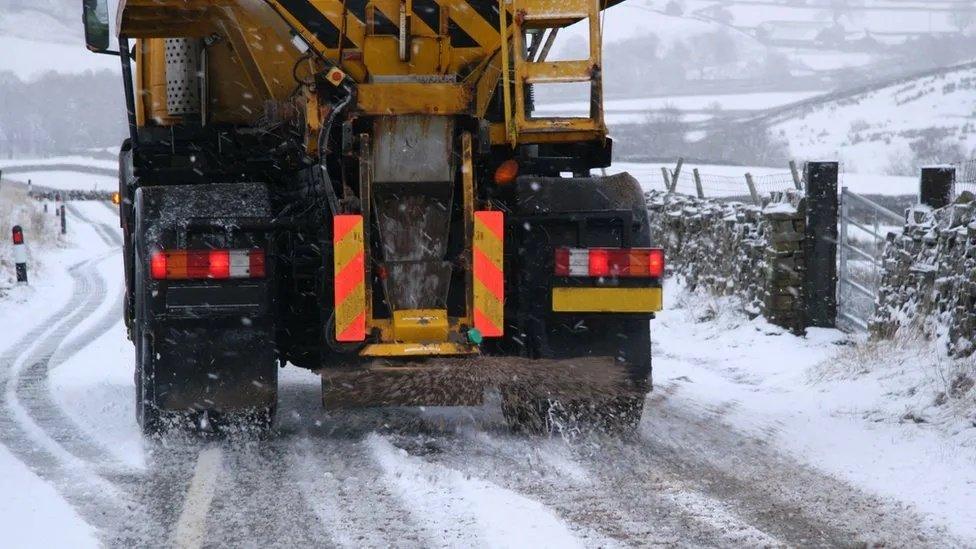
A yellow weather warning for snow and ice has been issued for some parts of Northern Ireland on Thursday
The motorway network and the A1 are covered by private gritting contractors and will be treated as normal, the Department for Infrastructure (DfI) has said.
Snow in some difficult areas on high ground will also be cleared.
However, it is unlikely any other roads will be treated - the two unions whose members operate gritters say they are taking part in a a week-long strike action from Thursday.
The action coincides with a period of very cold weather, with a snow warning for the middle of the week.
The DFI has warned people should only travel if absolutely necessary and asked that people "reduce speeds and be very mindful of other drivers".
Can I put my car through its MOT on Thursday?
If you have an MOT appointment or a driving test scheduled, the advice is to attend as normal unless you are contacted by the Driver and Vehicle Agency (DVA).
If your appointment has to be cancelled, the DVA will let you know either by phone or email.
However, the Department of Infrastructure has said a number of services will be affected by the strike, such as:
Repair of serious infrastructure defects such as collapsed manholes or potholes
Response and clear-up operations when there are incidents on the road such as oil spills or unexpected debris
Clearing and cleansing of drains
Strangford Ferry services
Significantly reduced capacity to respond to flood emergencies
Significant delays in responding to calls to the flood incident line
Will agriculture be affected by the strike?
Yes - the Department for Agriculture, Environment and Rural Affairs (DAERA) has warned of disruption to a number of its services as a result of the strike.
It said that many of the veterinary and animal health checks that are required at Belfast Harbour, Larne Port, Warrenpoint and the airports are expected to be disrupted, as well as those at meat plants.
Field operations including bovine TB and animal welfare inspections are also likely to be affected.
And what about council services? Will they be affected by the strike?
BBC News NI have asked all 11 local councils in Northern Ireland and, so far, five have told us a similar story - that their services, such as bin collection and leisure centres, will be relatively unaffected.
Antrim and Newtownabbey said it will be "business as usual", while Belfast City said bin collections will continue while parks and playgrounds will be open.
Fermanagh and Omagh council said its staff were not taken part in the strike and that its services "should operate as normal".
Will police officers be on strike?
No. By law police officers are not allowed to go on strike. However, Liam Kelly from the Police Federation of Northern Ireland said that the absence of police officers on the picket lines "should not be misinterpreted".
He said that they too are "angry, frustrated and dismayed by the actions of the secretary of state and his NIO colleagues who are using public sector pay as a blunt way of bludgeoning and bullying for political ends".
While police officers won't be on strike, the force includes about 2,000 civilian staff who could potentially be on strike. For instance, several hundred support staff who are members of the union Nipsa will be walking out.
Will the courts be affected?
The Department of Justice has said there will be a limited courts and tribunal service - those that have been affected should have been informed, but anyone concerned should contact their legal representatives or the relevant courts before Thursday.
Would the strikes end if the DUP returned to Stormont?
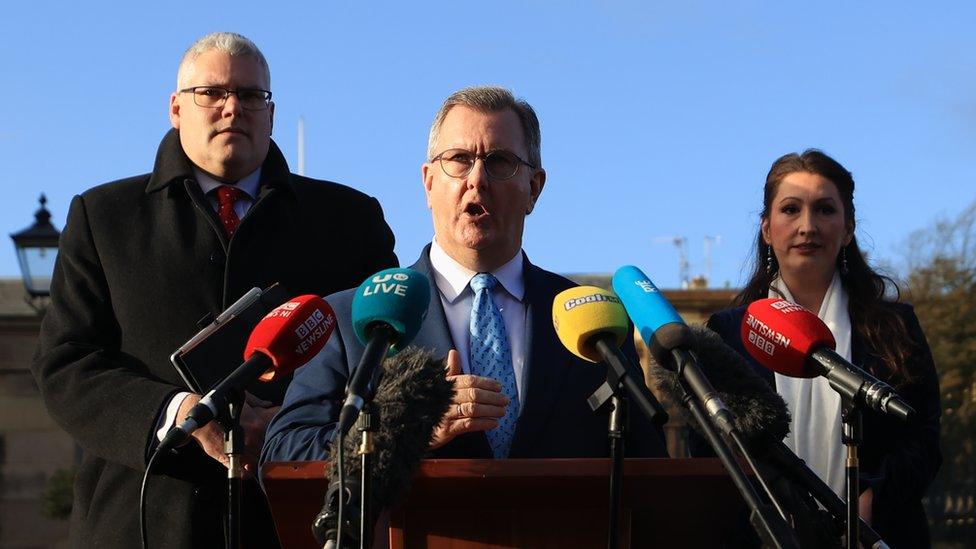
The DUP said on Monday that "significant progress" had been made towards restoring the executive.
The UK government has offered the Northern Ireland political parties a financial package worth £3.5bn for the return of an functioning Executive at Stormont.
The secretary of state has said that this package includes £584m to settle public sector pay claims and he has insisted, despite calls from unions, that he has no legal power to release the money himself as it is a devolved matter.
This move is part of attempts to get the DUP to end its boycott of power sharing, which the party has so far resisted.
However, even if the party did return to government, it would not necessarily mean the disputes would be settled. The money provided by the government would mean pay negotiations could start but the bargaining process could take months.
What happens next?
Political talks are ongoing but, so far, there is no indication of any success in the short term.
Mr Heaton-Harris has said that if the executive does not come back by Friday, he will have decisions to make and that he would set out his next steps "in due course".
This could involve laying out new legislation at Westminster but he did not give details.
Meanwhile, the head of the Northern Ireland Civil Service Jayne Brady has joined calls for funds to be released to settle the pay dispute.
In a letter to the secretary of state, she added the strike showed the "frankly untenable position we are now in".
DUP leader Sir Jeffrey Donaldson also said Mr Heaton-Harris should release the money, adding that "you don't need to have a functioning Stormont in order for the secretary to use the temporary powers that he has given to himself for that purpose," he said.
Meanwhile, a trade union leader told the Belfast Telegraph that civil disobedience, including blocking roads and occupying buildings, was a possible next step if the pay dispute continues.
- Published14 January 2024
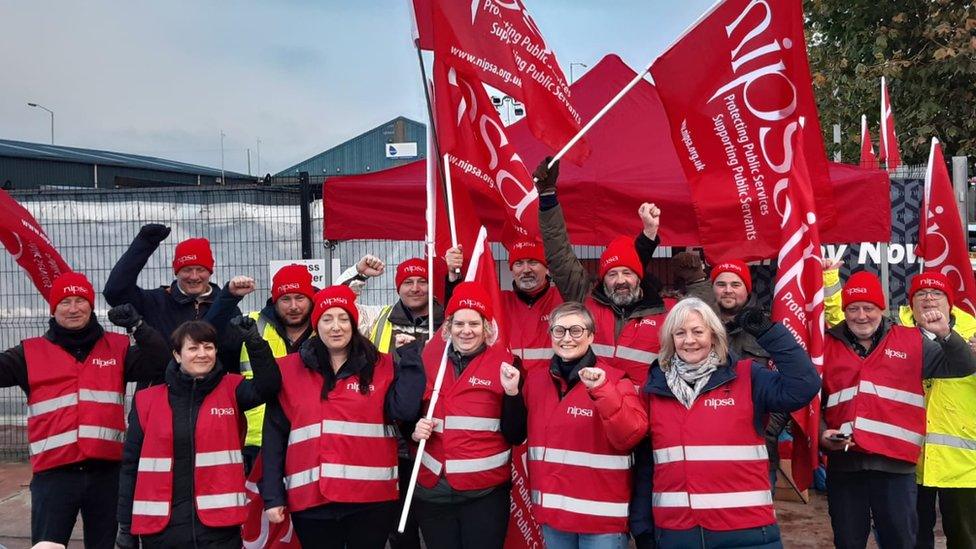
- Published11 January 2024
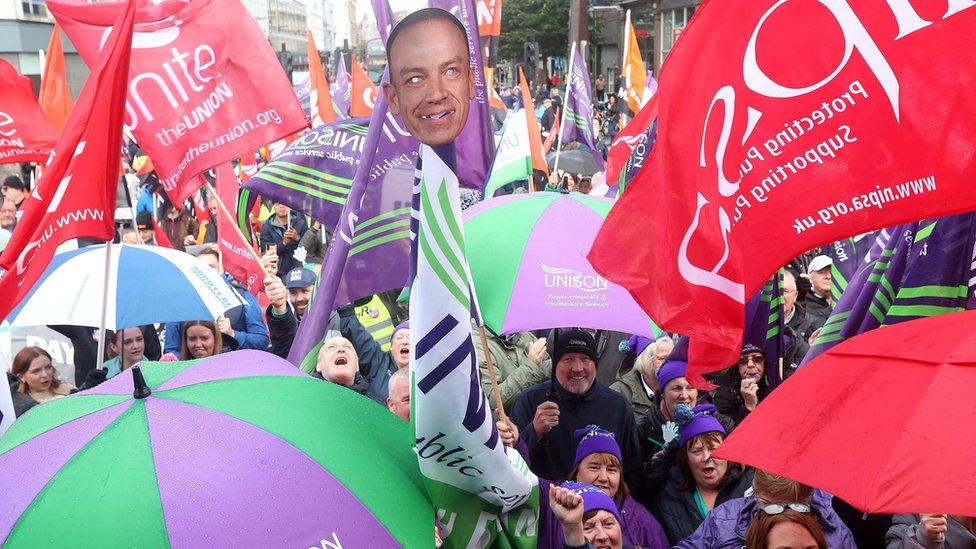
- Published12 January 2024
